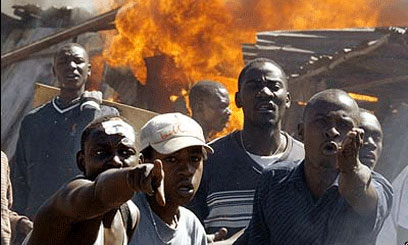
The office assured victims of the violence that left over 1,300 people dead and more than 500,000 others displaced that it was considering diverse options including reverting to other laws other than the Penal Code that is currently being used to deal with the cases/FILE
NAIROBI, Kenya, Aug 17 – The office of the Director of Public Prosecutions (ODPP) has said it is exploring alternative avenues that will give justice to the victims of the 2008 post-election violence after realising that prosecutions may not be possible due to inconsistencies and lack of evidence to punish direct perpetrators.
The office assured victims of the violence that left over 1,300 people dead and more than 500,000 others displaced that it was considering diverse options including reverting to other laws other than the Penal Code that is currently being used to deal with the cases.
“The prosecutor is having a challenge in marrying elements of crime to the incidences or to the facts of the case. That in itself does not mean that there are no other alternative ways of prosecution that can be invoked,” the Chairperson of the Task Force appointed to probe the cases Dorcas Oduor told a news conference.
She insisted on an urgent need to explore other platforms to handle the cases since it was clear that crimes took place during the violence but prosecutions have been hampered by inadequate evidence.
Oduor noted that the prosecution policy and the Constitution had strict provisions that disqualified crimes committed during the 2008 violence from meeting the threshold described under the Penal Code.
Oduor called for a relaxed approach that will first recognise that crimes were committed during a difficult situation and that crimes were carried out by masses on masses which makes it difficult to prove them under the Penal Code.
“Some complainants saw their houses being burnt from a distance but they were unable to identify the invaders. They stated that arsonists moved in large groups. Identification of alleged perpetrators was inadequate. They identify them by their way of dressing, ethnicity or the kind of songs they were singing,” she explained.
According to Oduor the post election violence cases should have been dealt with under a more accommodative legislation instead of the Penal Code that has high threshold and as such better results would have been achieved in the prosecution of lower and middle level perpetrators.
“Mass atrocities occurring during a conflict period, the threshold should be lowered a bit. This means element of crime would be broadened; there would be reparations and a fund to help the victims. The restriction is also brought about by the kind of legislation that we applied,” she complained.
She suggested that the International Crimes Act would have also been one of the options that can best deal with crimes of such nature especially where victims are not in a position to identify their attackers.
“We are looking at offences very strictly where the suspects have been identified in person. Where we see an offence was committed but it was difficult to get evidence we will invoke other alternatives,” she assured.
In its attempts to resolve the post election violence, the task force announced its commitment to explore other means including working with the United Nations and the civil society to ensure victims get justice.
She further singled out the establishment of a special unit within the High Court as a possible alternative especially in dealing with murder cases.
According to the interim report of the task force 2,411 suspects had not been identified in the 4,408 files reviewed so far.
The report indicated that the task force had received 616 murder cases, 3,876 arson cases, 866 cases of house burglary and among others 377 rape cases.
So far, there have been 24 convictions and three acquittals and there are 19 pending arrests in relation to the post election violence.
The taskforce whose date expired last month is seeking additional time to complete the remaining 1,500 pending files out of the total of the 6,000 files it was mandated to handle.









































